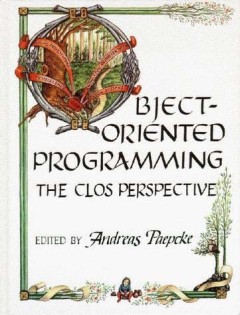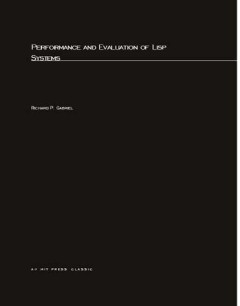Filter by

Object-oriented programming :the CLOS perspective
To date, books on object-oriented programming have focused either on the methodology of the object-oriented paradigm or on teaching the details of a particular programming language. This collection takes a different approach, examining one object-oriented programming language - the Common-Lisp Object System (CLOS) - as a modern programming tool. The fourteen contributions examine CLOS from a va…
- Edition
- -
- ISBN/ISSN
- 9780262256759
- Collation
- 1 online resource (viii, 352 pages) :illustrations
- Series Title
- -
- Call Number
- -

Performance and evaluation of Lisp systems
This final report of the Stanford Lisp Performance Study, conducted over a three year period by the author, describes implementation techniques, performance tradeoffs, benchmarking techniques, and performance results for all of the major Lisp dialects in use today. A popular highlevel programming language used predominantly in artificial intelligence, Lisp was the first language to concentrate …
- Edition
- -
- ISBN/ISSN
- 9780262256193
- Collation
- 1 online resource (xiv, 285 pages).
- Series Title
- -
- Call Number
- -

The art of the metaobject protocol
The authors introduce this new approach to programming language design, describe its evolution and design principles, and present a formal specification of a metaobject protocol for CLOS. The CLOS metaobject protocol is an elegant, high-performance extension to the CommonLisp Object System. The authors, who developed the metaobject protocol and who were among the group that developed CLOS, intr…
- Edition
- -
- ISBN/ISSN
- 0585358125
- Collation
- 1 online resource (viii, 335 pages)
- Series Title
- -
- Call Number
- -

LISP 1.5 programmer's manual :the Computation Center and Research Laboratory …
Includes index.The manual describes LISP, a formal mathematical language. LISP differs from most programming languages in three important ways. The first way is in the nature of the data.The LISP language is designed primarily for symbolic data processing used for symbolic calculations in differential and integral calculus, electrical circuit theory, mathematical logic, game playing, and other …
- Edition
- -
- ISBN/ISSN
- 9780262287722
- Collation
- 1 online resource (vi, 106 pages)
- Series Title
- -
- Call Number
- -

The seasoned Schemer
The notion that "thinking about computing is one of the most exciting things the human mind can do" sets both The Little Schemer (formerly known as The Little LISPer ) and its new companion volume, The Seasoned Schemer , apart from other books on LISP. The authors' enthusiasm for their subject is compelling as they present abstract concepts in a humorous and easy-to-grasp fashion. Together, the…
- Edition
- Second edition
- ISBN/ISSN
- 9780262287883
- Collation
- 1 online resource (224 pages).
- Series Title
- -
- Call Number
- -
 Computer Science, Information & General Works
Computer Science, Information & General Works  Philosophy & Psychology
Philosophy & Psychology  Religion
Religion  Social Sciences
Social Sciences  Language
Language  Pure Science
Pure Science  Applied Sciences
Applied Sciences  Art & Recreation
Art & Recreation  Literature
Literature  History & Geography
History & Geography